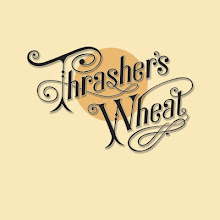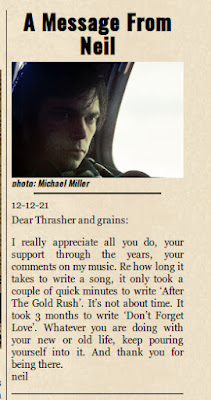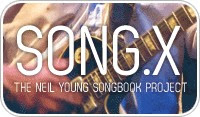REVIEW: Neil Young's Harvest 50th Anniversary Edition (CD/DVD) | All About Jazz
Here is an in-depth review of Neil Young's Harvest 50th Anniversary Edition (CD/DVD) | All About Jazz by
Worthy of a Grammy nomination in itself, archivist/photographer Joel Bernstein's clear-headed combination of prose and photos in the hardbound five-inch square fifty-six pages, combined with the images of Hendry Diltz and others), reveals at least some of the details of the period. Young himself did not divulge much of the kind till years later: serious back issues and treatment with medication thereof prevented him from playing too much electric guitar the way he usually did—there is a photo of him in traction on page eight —which may also account for the turgid motion that so often prevails throughout the LP.
In contrast to the commanding combination of fragility and resolute strength so evident on the BBC solo footage (where the audio is oddly muffled at certain points), "Words" simply plods on, much like "Old Man" from the album proper. In stark contrast, the nuances of the latter's gorgeous melody, like that of "Out On The Weekend," become resplendent when Young plays them solo on acoustic guitar in a circle-in- the-round setting captured by the BBC.
Meanwhile, "Are You Ready for the Country?" lacks a genuinely spry bounce despite the presence of savvy Nashville sessioneer drummer Kenny Buttrey. And, contemporary political correctitude aside, as with the social diatribe that is "Alabama"—a sequel to the similarly simplistic thinking at the heart of "Southern Man"—"A Man Needs A Maid" doesn't benefit from the heavily-orchestrated arrangement much more than "There's A World."
In comparison, a solo performance recorded live of "The Needle and The Damage Done" is the best composition to find its way to this release. There were some others of equal and arguably greater quality that unfortunately did not become final inclusions either, but in light of how Young cobbled together other albums from a variety of sources—American Stars 'n Bars (Reprise, 1977) is just one—it's reasonable to suggest some of these live cuts, plus the outtakes, would make for a better album than Harvest (the forced rhymes of which song might compel another name for that LP).
Arguably superior to anything on the album as it was eventually released, "Bad Fog of Loneliness" is among the three included on a woefully-short (seven-minute nine-second) CD labeled 'Harvest Outtakes" (considering the time available on a disc, they might have been included with the LP's ten cuts). It swings unlike most of the band tracks on the album proper and although "Dance Dance Dance" is proportionately slight compared to the aforementioned song, its upbeat air, thanks no doubt in part to the presence of Tony Joe White on electric guitar, would effectively lighten the mood in juxtaposition with "Journey Through The Past.''
Full review of Neil Young's Harvest 50th Anniversary Edition (CD/DVD) | All About Jazz by
More on PREVIEW TRAILER: Neil Young: Harvest Time.
(Click photo to enlarge)
- Neil Young (himself!) Unboxing Harvest 50th Anniversary Edition (Vinyl)
- Comment of The Moment: Neil Young's 'Harvest Time'
- Details on the 50th Anniversary Edition of the album Harvest
- HARVEST Outtakes by Neil Young: "Journey Through The Past"
- Unboxing Video: Harvest 50th Anniversary Edition by Neil Young
- ESSAY: Neil Young’s Harvest at Age 50 by Harvey Kubernik
- "Neil Young's Harvest: A Multi-Voice Narrative" by Harvey Kubernik
- Neil Young Remembers "The Innocence": WORDS
- Neil Young's "Song of the Day": "Are You Ready The Country?" + VIDEO
- Neil Young's Memories of Recording Harvest Album: "Sessions of a Lifetime"
- Neil Young's Song Of The Day: "Heart of Gold" + 1971 Interview
- Unboxing Video: Harvest 50th Anniversary Edition by Neil Young
- INTERVIEW: Neil Young Says He Was Offered Millions to Tour Harvest Album | AARP
Labels: album, box set, documentary, film, harvest, neil young, recording, review, video



































 Human Highway
Human Highway

















 Concert Review of the Moment
Concert Review of the Moment





 This Land is My Land
This Land is My Land

 FREEDOM In A New Year
FREEDOM In A New Year









 *Thanks Neil!*
*Thanks Neil!*




![[EFC Blue Ribbon - Free Speech Online]](http://www.thrasherswheat.org/gifs/free-speech.gif)











 The Unbearable Lightness of Being Neil Young
The Unbearable Lightness of Being Neil Young Pardon My Heart
Pardon My Heart



 "We're The Ones
"We're The Ones  Thanks for Supporting Thrasher's Wheat!
Thanks for Supporting Thrasher's Wheat!




 This blog
This blog 
 (... he didn't kill himself either...)
#AaronDidntKillHimself
(... he didn't kill himself either...)
#AaronDidntKillHimself









































































 Neil Young's Moon Songs
Neil Young's Moon Songs




 Civic Duty Is Not Terrorism
Civic Duty Is Not Terrorism Orwell (and Grandpa) Was Right
Orwell (and Grandpa) Was Right


 What's So Funny About
What's So Funny About 



10 Comments:
Bad Fog is a great song but how to make the judgment that it is (perhaps) better than anything on the original argument is difficult and not given in the above review. In fact, Bad Fog seems a bit lightweight next to the the song "Harvest" which, in my view, cuts pretty deep. This song is about emotional turmoil and it finds its way into consciousness without becoming literal. How this reviewer gets to "forced rhymes" is another good question? What makes these rhymes "forced"? "As the days fly past though we lose our grasp" seems right to the point of the song and so organic to the themes.
Harvest is, maybe, a way of thinking and I hear echoes of the song in Thrasher. The idea of harvest resonates with the current record and also with Comes a Time (in the field of opportunity). As metaphor, it is striking to me how close it comes to the how Neil thinks or how we can think? The process, once started is inevitable to form of conclusion but the specifics are not finished or definite, there is room to invest, struggle, and grow. But there are also contingencies and intrusions that cannot be predicted or controlled- in short, Neil has always adopted an ecological form of thinking. Harvest works on precisely this content and the danger is for the songs to become too literal and so "local." Harvest, the song, is metaphysical, it is about our condition as human beings where there are many points to connect.
Why would a reviewer who clearly does not appreciate Harvest as an album be the one tasked with writing up the 50th anniversary package of it? Seems a halfassed attempt to cover this major release; they didn’t even go for the full vinyl edition. Surely its CD counterpart must be a little disappointing, boasting a 3-track bonus disc. A cool 7 inch record of Neil Young rarities would be far more impressive. It sounds like he liked the book. I bet the large version that accompanies the LPs is an even finer product. Yes, it’s very arguable that the solo version of A Man Needs A Maid would have been preferable to the LSO. But a recent viewing of Harvest Time reveals the inherent masculinity of said orchestra (all male players) fits thematically in an unexpected way, and the finished song does indeed sound like an old movie soundtrack, as its author intended. However I will not even entertain any disparagement of the Stray Gators’ sound on this record. You don’t mess with Ben Keith or the lonesome sound of his pedal steel will haunt your dreams forever. It’s amazing what the two of them achieved together over the years. And although Neil’s harmonica prowess is now granted, this was the first time it had ever been put to acetate. Hell, he’d only been playing the thing onstage for a few weeks! Also, Alabama isn’t a political statement, we’ve just always expected it to have been. Now we have heard Neil explain that the song is about himself, and the title just sounded good to sing. From Nashville to Broken Arrow, Harvest remains a statement of power and beauty. As Abner points out with his example, the term forced rhyme is wrongly applied here. Those are near rhymes, sometimes known as “lazy rhymes,” but this time it’s the review that’s lazy.
This was a bad review of a good release. (Although I certainly would have liked to hear more takes, showing how the songs evolved, as the Beatles do in their current re-releases!)
But my question revolves around Tomatron's comment that Alabama isn't political, but is "about himself". I've read in his own books that Neil regretted his simplification of attacking a section of the country in both Alabama and Southern Man, but never heard that the songs weren't political, but "about himself".
Care to provide a source?
Source is Harvest Time, Neil speaks about his original intention for the song. I’ve only seen it once so can’t quote directly.
Today December 8th I celebrate the life and spirit of John Lennon…... “Just another human; a victim of the insane”.
Let your spirit soar John, we all miss you dearly.
Peace 🙏
@ Abner - Bad Fog is definitely a great song in the "obscure neil song" dept.
Regarding Harvest having echoes of Thrasher, now that's a new connection!
Maybe Harvest is metaphysical and Thrasher is more physical and less meta?
dunno, cause you got us on some of the heavier philosophical theories.
@ Tomatron - in some ways regret featuring this review.
But it was one of the only reviews in depth. In depth today means more than 3 short 'graphs.
And All About Jazz is fairly well regarded for audiophiles. a few cuts above the Pitchfork ratings and Rolling Stone star systems
Good point on the rhymes.
@ willforestwater - ahh, Alabama.
man, this is right in our strike zone.
Frankly, we think Neil has distanced from this just b/c of the challenge of discussing in the climate extremes we face. but are the "politics" of today any dicier than the 60's really?
As Tomatron notes, Neil discusses song in the film Harvest Time.
In fact, he makes it sound like he could of picked Mississippi randomly. But probably found Alabama worked better lyrically.
The real question is how Neil draws a line back to himself given the song subject. The song clearly projects the KKK imagery with lines like:
"See the old folks tied in white ropes"
(which incidentally, is literally filmed in PARADOX, where Neil is an old man tied to a white rope w/ DH.
@ Dan - thanks for reminder.
HBD John Lennon ... soar on ...
Given the insight added by the Harvest Time quote regarding Alabama, the song can be seen in, if not a brand new light, a more complex one, where it is elevated above its status of Southern Man II. It seems like the self-referential lines begin to incorporate more nods to Southern and country culture as the verses add up.
At first, the subject is primarily Neil himself, dropping minor allusions to keep that country tone going (“the devil fools with…” “swing low,”) as he expresses his personal feelings at the end of March ‘71 [NYA manuscript caption]. “You got the spare change, you got to feel strange” is his ambivalent mood about being a “rich hippie.” “And now the moment is all that it meant” sounds like a critique of a hippieism itself. In the original manuscript, Neil put the word “moment” in quotes, tellingly.
Where Southern Man was a straightforward social commentary and political statement, Alabama is a metacognitive meditation, a critique/questioning of self. Here the singer sings to himself, playfully naming himself “Alabama.” He recognizes that he is affecting an American style, all the while an outsider. This perspective will be developed in a later line, so let’s look at that chorus first. Rusties will recognize the references to self right out the gate. “…weight on your shoulders that’s breaking your back,” was written between Neil’s major back injury and the resultant surgery. We know he was in physical pain during this time and would hardly stand up with an electric guitar until months later. “Your Cadillac has got a wheel in the ditch and a wheel on the track.” Know anyone with a fondness for big old cars and ditches? [note: The first Caddy I could find in Special Deluxe was the limo he bought in ‘74 when he and Zeke were on the road with the CSNY tour.]
The next verse names Alabama as the person/subject and, separately, as the place itself (“broken glass windows down in Alabama”) The irony of banjos playing through these broken windows but that also “take you down home” speaks to the personal conflict already established and connects it to the character’s namesake state. The chorus returns, reinforcing the pain and strife of the singer/his subject. The final verse brings back Neil’s discomfort with fame living in the States. “Oh Alabama, can I see you and shake your hand?” is followed by the wry “make friends down in Alabama.” These lines bring to mind Neil’s comment in Harvest Time regarding his new famous life, where people’s eyes don’t look right when they talk to him. [Again sorry for the lack of direct quotes, I’m paraphrasing from memory of the screening last weekend.]
“I’m from a new land, I come to you and see all this ruin, what are you doing?” Another enigmatic line, but following the lyrics above, it seems he is stepping out of the Alabama identity and into the world of Southern Man, having established his own voice as full of contradiction and self-doubt. This seems to add the weight of credibility based in humility to the critical observations first laid out with “see the old folks tied in white ropes.” In fact, that particular line can be read not just as “them Southern folk are KKK,” but that they themselves are tied up, bound by the shameful side of their own heritage, unable to change. The ropes themselves are white, after all.
After asking “what are you doing?” Alabama closes with another question: “You got the rest of the union to help you along/ What’s going wrong?” A mere Southern Man retread would have left this line a reaching throwaway. It doesn’t quite make sense posed directly to the state of Alabama. But given a double meaning whose main purpose is an inward questioning, the line lands hard. We can easily see “the rest of the union” as CSN, Crazy Horse, or even the Stray Gators, from all of whom Neil has begun to isolate himself. He knows they support him, so why is he struggling? It’s worth noting that Neil had expected to be finished with Harvest by April [an offhand remark heard in the movie]. Alabama was written on March 30th, 1971 and no more recording was done until September. When Alabama was penned, it wasn’t quite Harvest Time yet.
Tomatron, insightful and new to me. This changes the song.
@ Tomatron - CotM @
http://neilyoungnews.thrasherswheat.org/2022/12/comment-of-moment-alabama-neil-youngs.html
Post a Comment
<< Home